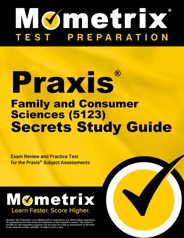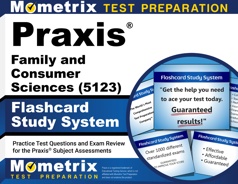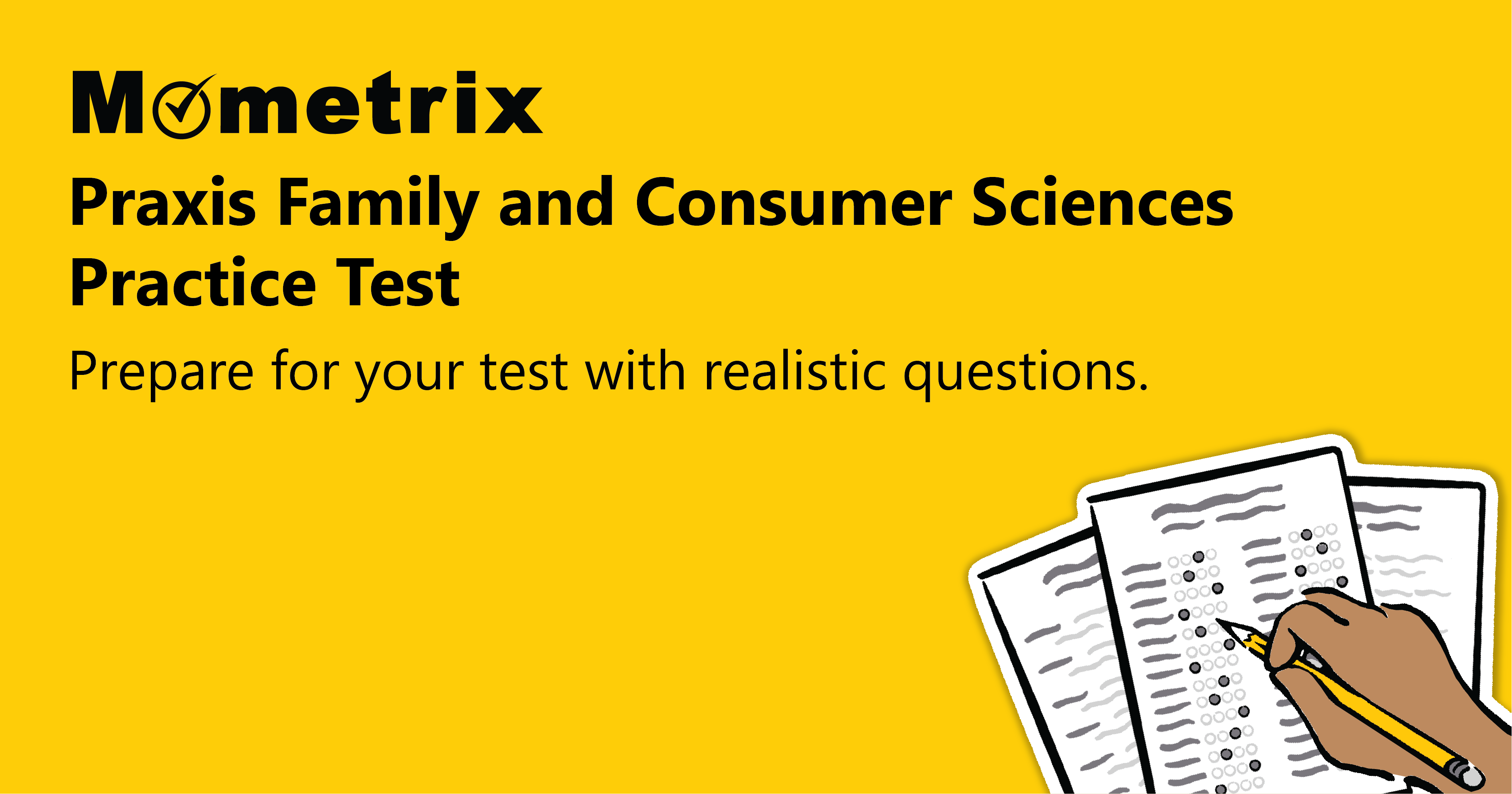The Praxis® Family and Consumer Sciences exam is designed to ensure individuals are prepared to serve as middle and high school Family and Consumer Science teachers.
Click “Start Test” above to take a free Praxis Family and Consumer Sciences practice test!
Exam Outline
The Family and Consumer Sciences exam contains 120 selected-response questions and has a time limit of 2 hours.
The exam is split into six content categories, which are designed to cover the various competencies and points of knowledge that a Family and Consumer Sciences teacher should possess.
I. Family, Career, and Community Interrelationships (22 questions)
The questions in this category assess your knowledge and abilities in the following areas:
- Career development through family and consumer sciences
- Consumer economics and family resources
- Family science
II. Wellness, Nutrition, and Food Science (27 questions)
The questions in this category assess your knowledge and abilities in the following areas:
- Individual and family health and wellness
- The role of food in individual, family, and community health and wellbeing
- Food production, preparation, and service procedures
III. Human Development and Interpersonal Relationships (23 questions)
The questions in this category assess your knowledge and abilities in the following areas:
- Human development and instruction
- Early childhood education
- Parenting and interpersonal relationships
IV. Housing, Interior Design, Textiles, and Apparel (16 questions)
The questions in this category assess your knowledge and abilities in the following areas:
- The role of housing and interior design in individual, family, and community life and wellbeing
- Housing and design concepts pertaining to theory, principles, and elements of design
- Considering housing, interior design, and furnishings regarding various contexts
- Types of fiber and textile products and materials
- Basic design and construction skills
- Producing, altering, and repairing fashion, apparel, and textile products
V. Business Skills Across Career Pathways (16 questions)
The questions in this category assess your knowledge and abilities in the following areas:
- Career pathways and entrepreneurial opportunities in family and consumer sciences
- Integrating managerial skills, leadership skills, and ethical practices
- Components of quality customer service
- Managing human resources within the FCS career pathways to achieve goals
- Procedures that promote safety, security, and sustainability
VI. Professional Teaching Practices (26 questions)
The questions in this category assess your knowledge and abilities in the following areas:
- Curriculum
- Instruction
- Laboratory management
Check Out Mometrix's Praxis Family and Consumer Sciences (5122) Study Guide
Get practice questions, video tutorials, and detailed study lessons
Get Your Study Guide
Exam Registration
To register for the Praxis Family and Consumer Sciences exam, you will need to create an online ETS account. Once this account is created, you can apply to take the exam.
During the exam registration, you will be asked to select the test-taking format (remote or at a testing center), test location (if you are taking the test at a testing center), and test date. You will also need to pay the $130 exam fee.
Test Day
In-person Testing
On the day of your exam, you should arrive at the testing facility about 30 minutes before the scheduled appointment. During the check-in process, you will be asked to sign in and present two forms of valid identification, one of which must be a photo ID.
Personal items will not be allowed into the testing room, so you will be asked to leave things like your phone, wallet, keys, and food items in your car or in a secure locker.
After you have been checked in and your personal items have been stored, you will be led to the testing area and given a brief overview of the testing system before starting your exam.
Remote Testing
To take the exam remotely, you must use a non-touchscreen laptop or desktop computer, and you must have a working speaker, microphone, and camera hooked up. Before test day, you will need to download and install the ETS Secure Test Browser on your computer, which is what you will use to take the test.
Your environment must be private, with no traffic in and out of your testing area. The area where you take the exam must be clear of all personal items, and you will not be allowed to wear headphones. The proctor will ask you to move the camera around so that your testing area can be observed.
Once the proctor has determined everything is ready, they will walk you through the examination process.
How the Exam is Scored
Your Praxis Family and Consumer Sciences exam score is calculated using a scaled scoring system that takes your raw score (the number of questions you answered correctly) and turns it into a scaled score from 100 to 300.
The score you need in order to pass the test is different depending on the state you take it in, but the score most states require is 153.
Check Out Mometrix's Praxis Family and Consumer Sciences (5122) Flashcards
Get complex subjects broken down into easily understandable concepts
Get Your Flashcards
FAQs
Q
How many questions are on the Praxis Family and Consumer Sciences exam?
A
There are 120 selected-response questions on the exam.
Q
How long is the Praxis Family and Consumer Sciences exam?
A
The time limit for the exam is 2 hour.
Q
What is the passing score for the Praxis Family and Consumer Sciences exam?
A
The required passing score for this exam varies depending on which state you take the exam in.
Q
How much does the Praxis Family and Consumer Sciences exam cost?
A
The examination fee is $136.
Praxis is a registered trademark of Educational Testing Service, which is not affiliated with Mometrix Test Preparation and does not endorse this page.


